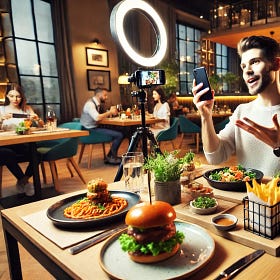Integrity. You have it or you don't.
The third in a four-part series about honesty, food influencers & food writers. In the end, you're either in it for the right reasons or not. Plus tips to separate the wheat from the chaff.
I started a four-part deeper exploration of the perceived lack of honesty among food influencers. Part Three builds on the previous discussions about how food influencers are not structurally incentivised to be honest and how social media channels are not structured to favour honesty. In the end, it comes down to the individual, plus my advice on how to navigate through it.
Three themes emerged in my conversations with people since embarking on this series of articles about the perceived honesty drought among influencers. The first two I addressed in Part I (Incentives) and Part II (Social Media’s shortcomings).
The third theme is that followers / readers want to know if the influencer or writer paid for their experience, and they want to know that front and centre.
Some argue that the path to honesty is paved by individuals who pay for the experience directly. I understand that view and, at times, I find myself almost swayed. It makes sense on the face of it. Someone who pays is more likely to speak candidly and unencumbered by broader incentives.
Moreover, nothing focuses the mind quite like putting a dent in your bank account. It causes you to ask whether an experience was worth it and whether others should follow in your footsteps. It gives tangible context to the commentator.
However, this view is overly simplistic.
There is a difference between correlation and causation. That is to say, just because two things happen together doesn’t mean one caused the other. The difference can be hard to see under the heap, and there is a heap of influencers and writers who don’t speak the whole truth for reasons already explored earlier.
My view is that honesty (and, perhaps, courage) comes down to the individual. You either have integrity or you don’t. If you do not have the dignity, ability or courage to inform the viewer or reader whether an experience is good or bad, then your motives are questionable and your credibility is rightly doubted.
I know respected writers—respected by me, respected by many—who accept invites, write and speak their minds.
and spring to mind as people who do this well in Dubai. (Courtney’s timely review of an invited dining experience, published just yesterday, is submitted to evidence.)Writers do not always see eye to eye, and having divergent opinions about an event or a place is not evidence of honesty or dishonesty on either’s part. There is a fallacious presumption that the negative experience is the real one and that the negative reviewer is, somehow, the truth whisperer.
I disagree with many writers; many disagree with me—go ask Courtney and Matt (ha!), but it does not make me wrong and it does not make them right. (Sorry, for picking on you both.)
recently unpacked an example of two British national critics with similar experiences resulting in wholly divergent views. The reading public is not a monolith, and neither is the writing bench. Differences of opinion are also better for you, the public.The more I’ve spent time on this topic and chewed over it with others, two simple guiding principles emerged.
Principle 1: all invites and gifting must be declared.
The reader or follower must know there is a tacit relationship between the restaurant and the writer/influencer, enabling them to apply as much cynicism as they wish. I absolutely include writers and their publications in this category. I edit EatGoSee, and anyone who writes for me about a gifted or press trip experience must declare it. It does not get published otherwise. Many publications do not do so, including those major titles you know and trust. I believe you deserve better.
Principle 2: Find, follow and support writers and content creators who speak with conviction about their experiences, whether purchased or gifted.
In the end, readers and followers must find their tribe, their North Star. As a guide, I use the following to ascertain whether someone is genuine and informed—or whether they’re full of it.
Look for detailed, informed content. Look for content that surveys the broader dining experience, from food to decor to parking to service standards to personality and character, the reservations system, the chef’s background, a restaurant’s comp set, its pricing structure, intended audience, location and, yes, the bathrooms or anything that stands out—good, bad or ugly. Yes, I love wit and a searing one-liner. You can fall in love with style, but you can only trust substance. Personally, I aspire to write about a place with context, detail and a tangible sense of its essence so that the first time you go, I want you to feel like it is the second time you’ve been. For those of us who take it seriously, we take this seriously.
Explanations. Good subject matter experts will not simply say whether something is ‘tasty’ or ‘bland’. They will cogitate, explain and underpin the evaluation with analysis. Disagreeing with that analysis may not make them wrong (see above), but it conveys expertise (see 1 above). It is its own form of persuasive advocacy. I cannot tell you how many times I’ve been to a restaurant and thought “I get what they mean”. Moreover, good restauranteurs and chefs will unpack detailed feedback, even and especially from (good) critics. Net, there’s space for everyone to be a winner: the venue, the reader/follower and the influencer/writer.
Not everything is sunshine and roses. If an influencer is a praise machine incapable of criticism, they are not reviewing; they are advertising. Do not trust, move on, be cynical. Life is filled with lackluster experiences and tiresome hyperbole is the reddest of flags.
Who is the centre of attention? Self-promoting influencers have a knack for centering themselves in their content. Social media rewards direct-to-camera footage (it is more compelling), but an influencer featuring prominently throughout their content warns me that they are selling themselves first, and that’s an incentive warning.
Cheese pulls, groaning tables, bulging eyeballs and performative reactions. When will this B.S. end? See 4 above. You know the ones. Unlike, unfollow.
Knowing when you don’t know. If you don’t know West African food well, but you are writing about it, own your lack of knowledge. People respect that. This sounds like a contradiction to 1 and 2, but it isn’t. Writers write about what they know and if you can only speak how the experience felt—wisely peppered with some after-the-event research or answers from the chef—then well-placed humility goes a long way to reinforcing their credibility. Don’t fake it.
Hypocrisy. Some claim to be whiter than white out, but find themselves at the tip of their own spear. I have seen you at the invited events. Quit lying to yourself and others. You’re only doing this to yourself.
Admit to getting it wrong. Mistakes are not fatal, and owning them can endear you to people. I have been fact checked by followers, sometimes publicly. It is embarrassing, but if you’re in the business of critiquing others, you must be able to take it. It’s time to pull up your Big Boy Pants.
Practice Principle 1. Tell us that you were invited, tell us that this experience was gifted. Tell us that this content is paid for through advertorial or other means. Tell me if you are actually a consultant for the restaurant that you are covering on Instagram or TikTok. I burn with the fire of a thousand suns at this B.S.
Hold them accountable. I regularly ask in someone’s comments or stories if an experience was gifted or invited, if it is not declared. Calling people out is not for everyone, but the accountability has to start somewhere.
Next: Part IV
As a writer and critic in the Middle East, there is a pernicious threat that stops me from going as far as I would want: the constant, low-bar to defamation charges, which is a criminal offence in this region. We will unpack this further in the next and final article.
Earlier Parts of the Series
Honesty is not the problem. It's not even the start.
About once a year, someone throws chum into the food-writing waters. Fractures emerge. Pious posturing ensues. Defensive statements are made.
Incentives Corrupt Honesty
If Freakonomics taught me anything, it’s that incentives matter. To understand incentives is to understand human nature. To use the carrot or the stick. To play the person or the issue.
Social media is a popularity contest, not an honesty box.
I stepped back from social media some time ago. I found it vacuous and unfulfilling. I wanted it to be a visual medium supporting my writing, but I was never satisfied. Worse, I saw the all-consuming stress it inflicted on others when the short-lived, addictive dopamine rush of engagement waned.
If you liked this article, please like, comment and share it with someone else who may enjoy reading it.
Liam is a restaurant critic, food and travel writer based in the Middle East. He owns EatGoSee and contributes to other publications. You can find Liam on Substack, Threads, Instagram, BlueSky or Facebook.








Now that I'm on the other side of the table, it's this: "Self-promoting influencers have a knack for centering themselves in their content. Social media rewards direct-to-camera footage (it is more compelling), but the influencer featuring prominently throughout their content warns me that they selling themselves first and that’s an incentive warning," that stands out. So many people want to dine where I work that have no business -- no integrity -- or even a relationship to the F&B industry. It's quite easy to see, but I think others might be swayed or impressed by large follower counts.
I want the WORLD to read this Liam! Absolutely spot on, every word of it (although some words I have to google for understanding, bear in mind English is not my first language). Personally I don't feel comfortable to accept a free meal and then critique it on social media if it was not upto the mark. I would feel more empowered if I had paid for it. Love that you have pointed out the 'Own your lack of knowledge' piece - several out there who probably would not even know how to boil an egg lol! I have tried several of these blogger recommended places and come away thinking 'what on earth'! The ones where I have had the option I have pointed out shortcomings to the management but I don't think it was well received - I mean who am I, considering a blogger with over 50K followers have come and raved about everything from food to service to ambience. You can bring in as many bloggers or marketing peeps to shout about your business but if the basics are not right, then it will struggle to find takers after the initial hype. Thanks again for sharing your thoughts on this matter, can't wait for Part 4.